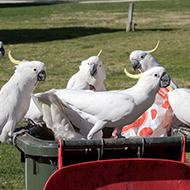
Researchers examine bin-opening behaviour spreading among Australia's sulphur-crested cockatoos.
Scientists have shown that cockatoos learn from each other a unique skill – lifting garbage bin lids to gather food.
In their study published in the journal Science, researchers confirm that cockatoos spread this novel behaviour – witnessed in various parts of Australia – through social learning.
The study is the first of its kind and shows that this behaviour by cockatoos is learnt, rather than a result of genetics.
Winged scavengers
Sulphur-crested cockatoos in Sydney, Australia, have been seen to open bins in a quest to scavenge food. In the study, researchers set out to see where this bin opening started, how it spreads and whether securing bins can help manage the behaviour.
Paper author John Martin, of the Taronga Conservation Society, said that the team launched a survey in 2018 to see how common bin-opening behaviour was. The survey asked questions such as, ‘What area are you from, have you seen this behavior before, and if so, when?’
“Australian garbage bins have a uniform design across the country, and sulphur-crested cockatoos are common across the entire east coast,” John explained. “The first thing we wanted to find out is if cockatoos open bins everywhere.”
Survey findings
By the end of 2019, the survey results suggested that residents from 44 areas had observed bin-opening by cockatoos – showing that the behaviour had spread rapidly and widely.
A deeper analysis of the results revealed the behaviour reached neighbouring districts faster than districts further away, suggesting that the new behaviour wasn't appearing randomly.
Lead co-author Barbara Klump of the Max Planck Institute of Animal Behavior said: "These results show the animals really learned the behavior from other cockatoos in their vicinity.”
An exception to the rule
In addition to the survey, the team marked around 500 cockatoos with small paint dots at three selected hot spots - to identify which birds had learned how to open bins.
They found that only 10 per cent of the birds had learned the behaviour – most of which were males. The rest waited until the “pioneers” opened the garbage bins before they helped themselves.
There was an exception, however: In late 2018, a cockatoo in a northern suburb of Sydney reinvented the bin-opening technique, and birds in neighbouring districts began to copy that behaviour.
Klump said: “We observed that the birds do not open the garbage bins in the same way, but rather used different opening techniques in different suburbs, suggesting that the behavior is learned by observing others.”
Researchers hope their findings will generate a broader understanding of urban living animals



 The Veterinary Medicines Directorate (VMD) is inviting applications from veterinary students to attend a one-week extramural studies (EMS) placement in July 2026.
The Veterinary Medicines Directorate (VMD) is inviting applications from veterinary students to attend a one-week extramural studies (EMS) placement in July 2026.